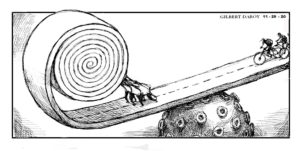In June 2020 at the University of the Philippines campus in Cebu, police arrested eight individuals who were participating in a rally against the anti-terrorism bill. There was no long, drawn-out investigation prior to the arrests. Authorities claimed that the protesters were violating measures against the spread of COVID-19, including a ban on mass gatherings. The protesters were out in the open air at the state campus. Observers of the protest claimed that participants observed social distancing and wore masks. The arrested individuals, called “Cebu 8,” were later released without bail. The arrests were said to have violated the longstanding “Soto-Enrile” accord which states that police and military are not allowed to interfere with peaceful protest actions held within the state university’s campuses, and the protests in June were clearly nonviolent before city police intervened. Authorities at the time claimed that the arrests were made not because they had a problem with the exercise of freedom of speech, but because of necessary measures against the coronavirus. At the height of the controversy over the anti-terrorism bill, a statement from the Philippine National Police said that the mass protest held at another UP Campus, in Diliman, Quezon City, posed a danger to public health, and encouraged the public to air their concerns and opinions through other means, such as over the internet. Meanwhile, red-tagging has continued to dog critics of the administration when they post online. Arrests have also been made for critical posts, leading lawyers, including Chel Diokno, to offer their services to those facing arrest for Facebook or Twitter content.
In November 2020, presidential spokesperson Harry Roque was photographed at a mass gathering in Cebu, which he said was held as part of the opening of the Bantayan Island Airport. It was an open air venue. Photographs showed crowds close together and wearing face masks, while Roque spoke into a mic some distance away. He acknowledged that the crowds at the time were not practicing social distancing, but that the masks would suffice because the event was in an open-air venue — a statement that is unsupported by available evidence. (Indeed, the weight of medical evidence suggests that a combination of all three can help prevent, but does not eradicate the possibility of, contracting COVID-19; the need for physical distancing is not obviated by the wearing of masks.)
Afterwards, Roque claimed that he, too, was taken aback by the number of people, and that the police had difficulties in controlling the crowd. He is not the only public figure criticized recently for flouting COVID-19 protocols; Sen. Manny Pacquiao was also recently photographed addressing a crowd which was in violation of physical distancing measures. Interior Secretary Eduardo Año has said that a probe will be launched into the two events. One wonders what fruits such an investigation might yield; as of this writing, the Inquirer has reported that the investigation on the mañanita issue faced by former Metro Manila police chief Debold Sinas is described to be “ongoing”—and the party was held six months ago. Other violators, including Sen. Koko Pimentel and Mocha Uson, have also not been arrested.
In the end, we know this: That nonviolent protesters who kept social distancing and wore masks have seen more jail time than any high-profile quarantine violators. On the one hand, the local government understandably had a difficult time controlling crowds at the Bantayan Island event, and perhaps confused or taken aback, none of the top-tier officials present thought to call for a dispersal or cancellation of this (nonessential) gathering. On the other hand, no such difficulty was had when city police went inside UP Cebu premises to pursue protesters, and no “investigations” happened before the arrests. The “Cebu 8” may have been released and the issue long forgotten by many, but eight months into quarantine, we continue to see plainly the difference in how top management handles its critics and its supporters—using the pandemic as a stick with which to beat the former into submission, and blithely excusing the lapses of the latter.
kchuarivera@gmail.com


